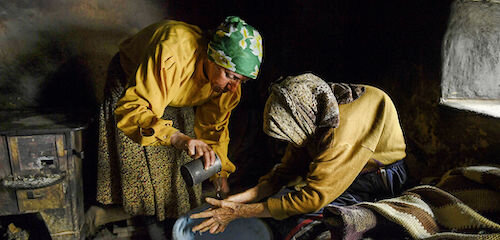Best International Feature Film: Ranking Every Oscar Nominee
We have reached our favourite category: Best International Feature Film (formerly known as Best Foreign Language Film). For us, this group honours what are usually five of the best films of the year. However, there is a catch: each country can only select one film. Sometimes, the film selected is out of popularity, rather than quality (we see this happen often). Some years, when there is a clear cut winner (like this year), studios and countries give up on stronger films, and use the opportunity to promote upcoming works. With all of this in mind, rarely is a nominee in this category a considerable dud. Even in this year’s list, the worst film here got a four out of five stars on our site. The rest were all deemed “exceptional” (four point five, to five stars, out of five). This is our “Best Picture”, because the lineup is usually much stronger and consistent than the actual Best Picture pool (which can be watered down by pedestrian, crowd pleasing works that catch on during awards season).
Here are your nominees for Best International Feature Film, nominated from worst to best.
Biggest Snub: Monos: Columbia
Actually, the biggest snub is Portrait of a Lady on Fire, but that’s because France selected Les Misérables instead. Nothing the Academy can do. So, we picked Monos for this spot instead, mainly because it seemed like it didn’t have a shot. How? It’s an unrelenting exercise in deconstructing the human psyche with the spirit of youths being weathered by political corruption. Not a single second of this film feels safe. If Monos isn’t delivering a statement at any part, it’s conjuring cinematic art. Monos is pure adrenaline.
5. Les Misérables: France
So France went with this film instead, likely because Les Misérables was catching on in popularity outside of its festival circuit run. It’s a strong debut for Ladj Ly, and a solid drama in its own right. However, there’s just a small amount of beginner’s jitters here: an ambiguous ending meant to be thought provoking (but falls flat), and the occasional convenience to further a plot (which can be distracting). Otherwise, Les Misérables is sickeningly intense. Its commentary on the cultural divides in a Parisian slum does speak volumes: an unfair world has given up on many marginalized groups, and now they are left picking each other off. The real enemy is not fought. Anger can be turned towards change, not hate.
Our review of Les Misérables
4. Honeyland: North Macedonia
What was meant to be a documentary short about beekeeping in North Macedonia became a fully fledged depiction of life shot over the span of years, captured by Tamara Kotevska and Ljubomir Stefanov. For the first time ever, a documentary was nominated for both the Documentary Feature and International Feature categories, and it’s easy to see why. Shot richly and with zero narrative or biased input, Honeyland takes on a life of its own as a piece of cinematic art with the deepest emotional rooting. At times, you may very well forget you are watching a documentary, and not some arthouse minimalist narrative. Honeyland is the blurred line, reminding us that even the most out-there cinema stems from life, and the difference between captured footage and orchestrated visual art can be barely noticeable.
Our review of Honeyland
3. Corpus Christi: Poland
The Academy has selected a few notable works that comment on the state of the country a filmmaker has come from (see Leviathan, A Separation, and Capernaum as a few examples). This year’s pick that falls underneath that description is Polish auteur’s Jan Komasa’s Corpus Christi: a drama about a juvenile convict ready to start a new life as a priest, despite not being granted the proper permission to don the collar given his past. What is meant to be a rebirth churns into a cycle of guilt that can never be cleansed. You may picture a more manic film than what you get with Corpus Christi, because Komasa decidedly went the philosophical route instead. For the long run, it benefits the film, because it allows Corpus Christi to linger with you.
Our review of Corpus Christi
2. Pain and Glory: Spain
This is how good it feels to have cinematic legend Pedro Almodóvar firing on all cylinders again. Pain and Glory is his finest work in over ten years, mainly because he has reflected on his own self more than ever before (even though his upbringing and youth has made many appearances in his films). Easily his 8 1/2, this film features some of his iconic alumni (including Penélope Cruz, and a nominated Antonio Banderas playing an interpretation of Almodóvar himself) during a writers block moment in his life. Focusing on the many self concerns Almodóvar (erm, sorry, we meant character Salvador Mallo) fixates on, Pain and Glory is a depressing, meta take on a cinematic memoir, blessed with the convenience of creativity and filmmaking processes. Welcome back, Pedro!
Our review of Pain and Glory
1. Parasite: South Korea
Honestly. Would any other film be here? Our pick of the best film of the year (and one of our favourites of the decade) surely would top a category like this. Bong Joon-ho has always made films reflecting classist struggles, but he never did a better job than Parasite. This delirious black comedy Hitchcockian thriller is the rise-and-fall of fortune, especially when it comes to the undermined lower classes. A hilarious satire that twists into an absolute bloodbath roller coaster. As a film in this category, Parasite speaks about the suffering of poorer communities in a comical, yet understanding, way, while taking jabs at the elite (while understanding them as human beings as well). The problems with stymied communities, as well as the blinded or hateful depictions of the wealthy (even the humbly successful) caused by systemic neglect, are all here. The fight to live a decent life is the main basis for Parasite, which Joon-ho is depicting on a personal level. Even contextually, Parasite wins this category (it also speaks on a global level). Judging just the films alone, Parasite is still the best of this batch. With the numerous nominations outside of this category (including Best Picture and Best Director), the Academy thinks so as well.
Our review of Parasite
Who we want to win: Parasite
Who we think will win: Parasite
Tune in tomorrow for our next Academy Award category! We’re reviewing every single nominee.
Andreas Babiolakis has a Masters degree in Film and Photography Preservation and Collections Management from Ryerson University, as well as a Bachelors degree in Cinema Studies from York University. His favourite times of year are the Criterion Collection flash sales and the annual Toronto International Film Festival.








